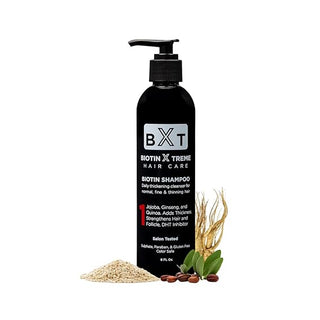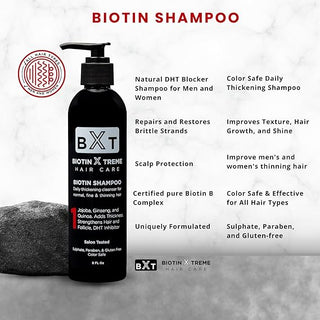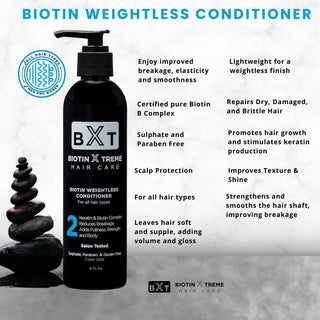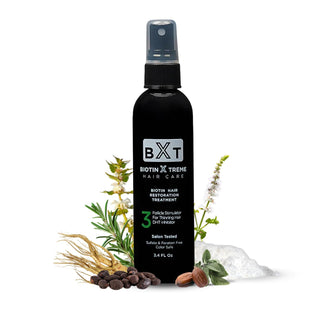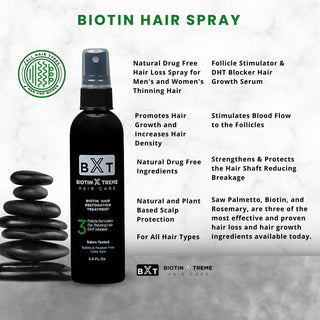Menopause is a natural biological process that typically occurs in women as they approach middle age. During this phase, a woman's body undergoes numerous changes as the hormonal levels fluctuate. Experiencing hot flashes, mood swings, and fatigue are common occurrences during this phase. Hair loss is another common symptom that often contributes to significant physiological trauma, including lower self-esteem. Understanding menopausal hair loss - its symptoms and potential treatments - can have a tremendous positive impact on your life. If you are a woman nearing menopause, this article is for you.
In this article, we have explained everything to you, from what causes menopausal hair loss to coping methods and treatment, one by one. See also: Best Shampoo for Thinning Hair Due to Menopause
Hair Loss and Menopause
Hair loss during menopause is often referred to as female pattern baldness or progressive hair thinning. It occurs in women during perimenopause, menopause, or postmenopause. Unlike men, women do not suffer from distinct bald patches. Most women experience overall hair thinning, typically starting from the front, sides, and top of the head. Research shows it is due to a hormonal imbalance, especially lowered production of estrogen and progesterone.
These hormones are responsible for hair growth. So, when their levels drop, hair grows more slowly and breaks easily, causing the hair on your head to appear thinner.
Similarly, androgen levels increase during this time in female bodies. Androgens, a group of male hormones, are responsible for multiple changes in a woman's body, including accelerating hair loss. Androgens shrink hair follicles, and as a result, hair doesn't grow back as quickly.
While hair loss is a common phenomenon, menopausal hair loss is a more advanced condition characterized by hair that appears brittle, dry, and lacks volume. Here is how to differentiate between normal hair fall and hair loss caused by menopausal hormonal imbalance.
|
50-100 strands of hair/day. It is a part of the healthy hair lifecycle. |
Gradual thinning of hair that becomes visible over time, specifically in the crown and part lines. |
|
Hair regrows naturally, which is normal. |
Usually, hair grows more slowly, and the texture also changes, appearing thinner and shorter. |
|
The reasons can be changes in stress level or climate. Often, the occurrence is temporary. |
Chronic or progressive. Caused by hormonal level changes. |
|
Hair shedding happens evenly. |
Mostly occurs at the top of the scalp. |
|
Hair texture does not change |
Hair becomes brittle and dry, and the texture changes. |
Some women may also experience frontal fibrosing alopecia or a receding frontal hairline. It happens due to shrinking hair follicles.
Often, there can be other factors contributing to hair loss, including stress, illness, and the lack of specific nutrients. A proper diagnosis is necessary to determine the real cause and, therefore, the treatment. So, the question is: Can menopausal hair loss be reversed?
Diagnosis and when to see a doctor
With the proper treatment, menopausal hair loss can be arrested and even partially reversed if addressed early. The most effective approach is to employ a multi-level process that combines hormone replacement therapy (HRT), topical minoxidil, and lifestyle modifications.
The results would vary depending on the underlying causes. Consulting a doctor or dermatologist to determine the right course of treatment is the best approach when symptoms start to appear.
Treatment Options: How to stop hair fall during menopause
These are some actionable techniques that can help control hair fall.
- Improve nutrition: Nutritional deficiencies are often linked to hair loss. Low iron levels can increase the rate of hair fall. Eating a balanced and nutritious diet can help boost hair growth. Make sure you include whole grains, fruits, essential fatty acids, and vitamin supplements such as B6 and folic acid in your diet to receive all the necessary nutrients.
- Reduce stress: As the estrogen level drops, women experience frequent mood swings, anxieties, and depression. Monitoring your stress, doing yoga, and meditation can help fight menopausal symptoms.
- Avoid styling tools: If you are already experiencing hair breakage, using heat tools such as a dryer and straightening iron can exacerbate the issue. Use natural hair dyes to color your hair, and apply a nourishing conditioner after washing to restore your hair's health.
- Personalized treatment: A treatment plan tailored to your unique needs can address the underlying causes of your condition, providing a more effective solution. It would include hormone evaluation, nutrition support, and topical treatment. Biotin treatment can be effectively used to reverse menopausal hair loss. Biotin, also known as Vitamin B7, can enhance hair health by supporting the production of keratin. It can help restore the B vitamin levels in your body that are affected by menopause.
- Strengthens hair: It reduces hair breakage, making your hair look stronger and appear fuller. It boosts keratin production, which reduces hair breakage and improves overall texture.
- Supports hair growth: It prevents shedding and induces regrowth.
- Fight nutritional imbalance: Women during menopause often experience nutritional imbalances. Supplements can help bridge the dietary gap.
Biotin Xtreme Hair Care
Biotin Xtreme Hair Care products are crafted with certified and pure ingredients, supported by research that helps reduce hair loss and promotes hair regrowth. The product range, which includes shampoos, conditioners, hair restoration sprays, and serums, strengthens hair roots and enhances overall scalp health. These products contain natural goodness, vitamins, and minerals.
While hair loss and menopause are unavoidable life events, Biotin Xtreme products can offer a better defense against menopausal hair loss by providing holistic nutrition to your hair and scalp.

